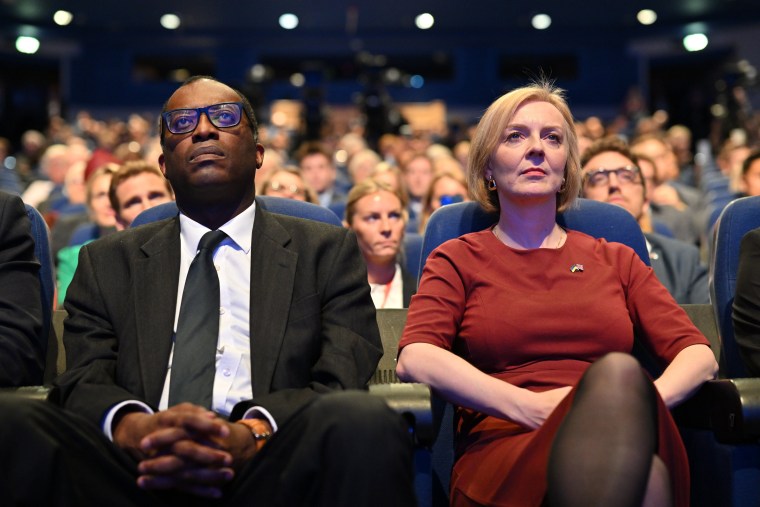Wall Street is worried something is about to break in markets. Here's where Jamie Dimon, Cathie Wood and 5 other top experts think the rupture will come.
ztayeb@businessinsider.com (Zahra Tayeb) - 8h a
- Wall Street is worried about building signs of stress in markets and the financial system.
- Whipsawing assets, economic strains and dysfunction in the UK are raising red flags.
- Here's what Jamie Dimon, Cathie Wood and 5 other experts say about where things could break.
Concerns that markets are near breaking point are gathering steam on Wall Street — and influential investors and experts like Jamie Dimon, Cathie Wood and Larry Summers have pointed to where a blow-up in the financial system could come.
Signs of
stress in the system are piling up, from whipsaw moves in assets, to growing threats to economic stability, to runaway fears of
distress at major banks like Credit Suisse. Political disarray in the UK has laid bare the risks in government bonds and pensions, usually seen as safe havens.
3 of 6 Photos in Gallery "Inflation has been a bigger problem but I think it has set us up for deflation," Cathie Wood said in a recent CNBC interview.The Ark Invest chief noted that chronic supply-chain issues, and Russia's ongoing invasion of Ukraine, have fostered higher inflation this year.However, she asserted that even elite retailers such as Walmart and Target are struggling to get rid of excess inventory, raising the prospect of widespread price cuts and deflation in the coming months.Wood added that consumer sentiment has plunged to record lows, in part because Americans are bristling at painful inflation. She suggested that trend could also pull down prices.
Auto Rotation Off
Full screen
3 of 6 Photos in Gallery©Patrick T. Fallon/Getty Images
Cathie Wood
"Inflation has been a bigger problem but I think it has set us up for deflation," Cathie Wood said in a
recent CNBC interview.
The Ark Invest chief noted that chronic supply-chain issues, and Russia's ongoing invasion of Ukraine, have fostered higher inflation this year.
However, she asserted that even elite retailers such as Walmart and Target are struggling to get rid of excess inventory, raising the prospect of widespread price cuts and deflation in the coming months.
Wood added that consumer sentiment has plunged to record lows, in part because Americans are bristling at painful inflation. She suggested that trend could also pull down prices.
"We are seeing multiple standard deviation moves in things like the Swedish krona, in Treasurys, in oil, in silver, like every other day. These aren't healthy moves," Alpha Theory Advisors' Benjamin Dunn
told CNBC.
Many strategists
blame the Federal Reserve's aggressive campaign to cool inflation by raising interest rates at the fastest pace ever. That has sent bond yields soaring and the dollar to 20-year highs – causing economic strains that are leaking into markets.
Here's where 7 top experts think something could break:
Jamie Dimon, CEO of JP Morgan: Credit markets, ETFs
"You saw it with the gilt markets here. You see a lack of liquidity in a lot of markets. … It is going to happen," Dimon said at a
London conference.
"The likely place you're going to see more of a crack, and maybe a little bit more of a panic, is in credit markets. And it might be ETFs, it might be a country, it might be something you don't suspect.
"If you make a list of all the prior crises, sitting here we would not have predicted where they came from, though I think you could predict at this time that it probably will happen. So if I was out there, I'd be very cautious."
Scott Minerd, global CIO at Guggenheim Partners: Stocks, emerging markets
"They're going to push until something breaks," Minerd
said recently, talking about the Fed.
Related video: Cathie Wood’s New Venture Fund Allows Small Investors to Invest
"I think the break will probably come through, you know, equity prices, but could come in other places — it could come in the emerging markets.
"Eventually, this will end in tears."
Cathie Wood, head of Ark Invest: Financial services sector
"There are also signs that there's distress out there in the financial services sector. We've been watching the credit default swaps of money center banks doubling and tripling, and you know, in Europe they're at all-time highs," Wood
told CNBC.
"So there are stresses and strains in the financial system that I believe have begun to show themselves, first with the
LDI crisis in the UK. And the reason this is happening is we are experiencing a major financial shock."
Mohamed El-Erian, chief economic advisor of Allianz: Zombie companies, earnings
"Zombie companies are finding it much harder to refinance. And if they can get refinancing, the cost of refinancing makes the numbers look completely different," El-Erian
told CNBC last week, referring to overly indebted companies that scrape by.
"Then you can go to various investors who overlevered, that's going to be an issue."
"The Fed is so late, it will probably
break something on the way to reducing inflation," El-Erian told
CNBC in a separate interview.
"The most likely victim is economic growth. I think the marketplace is starting to recognize that the risk of recession, and what that does to earnings is an issue."
Larry Summers, former US Treasury Secretary: Global economy
"What's
happened in the United Kingdom — some of that is a self-inflicted wound, but some of that is tremors of what's happening in the global system," he
said Friday at the Institute of International Finance's annual meeting.
"And when you have tremors, you don't always have earthquakes, but you probably should be thinking about earthquake protection."
Ed Yardeni, president of Yardeni Research: Emerging markets
"I think it's already breaking. What's breaking
is the soaring dollar," Yardeni
told Bloomberg, pointing also to the Fed's rate-hike campaign.
"A soaring dollar has been associated in the past with creating financial crises on a global basis.
"We have to have a global perspective on all of this, and this tight monetary policy here is having a tremendous impact on the rest of the world, especially in emerging markets."
Kamakshya Trivedi, Goldman Sachs' head of global FX research: Emerging markets
"In some of the more vulnerable pockets of emerging markets, where there is a substantial amount of dollar-denominated debt, there is already a debt crisis," Trivedi
said on a podcast.
"That's the place you need to look for the real debt problems that are beginning to take place."
CR
Add a comment
155






